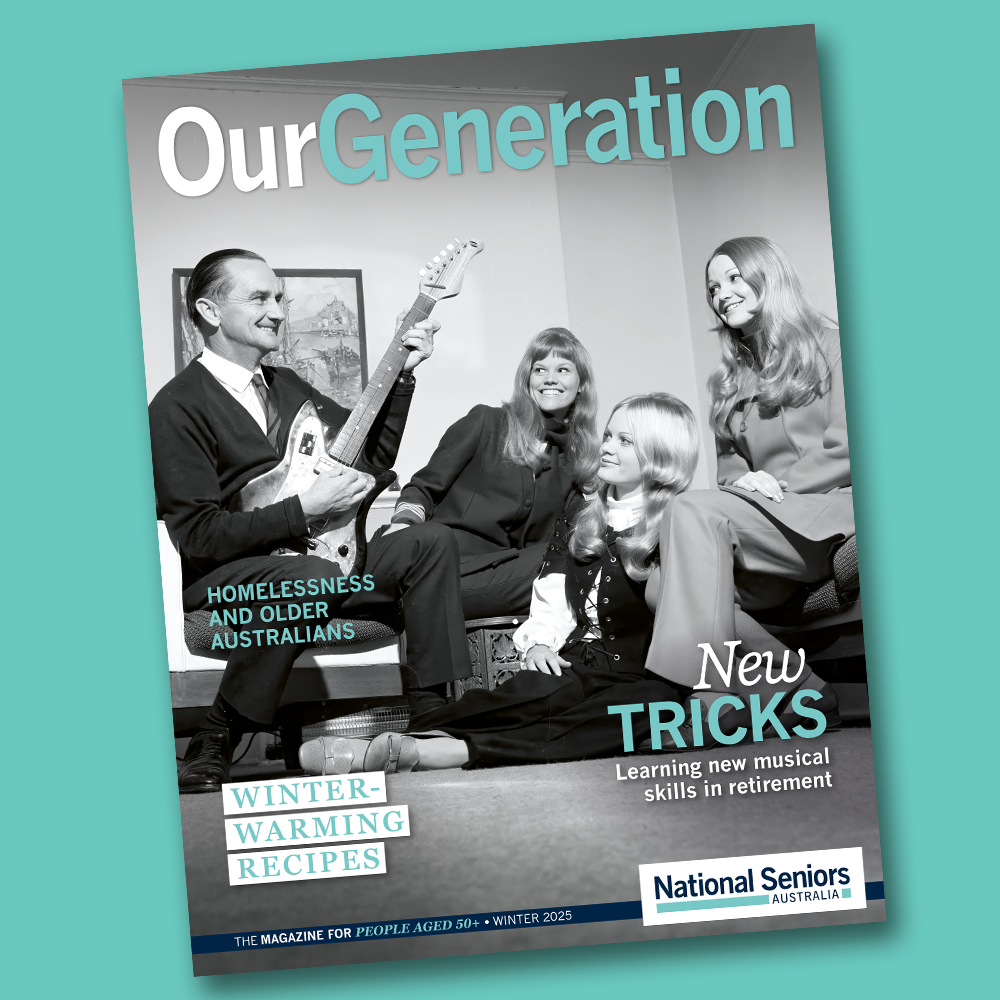Seniors going solo
What’s the difference between being lonely and choosing to navigate life independently? That’s the question we put to three older Australians and an expert on social connection.
By Nadia Howland


Why do some people feel lonely and anxious when left to their own devices for an extended period of time, while others feel completely at ease in the same scenario?
It’s an interesting question, and one that highlights how different we all are as individuals.
Provisional psychologist, Louise Read, says, “The answer to this lies in whether people are essentially introverts or extroverts.
A lot of people misunderstand what these titles mean, thinking that introverts like to stay at home and don’t talk much, while extroverts are loud and love going to parties.
“This can certainly be the case, but in fact, introversion and extroversion really describe whether people gain their energy by being on their own or whether they gain their energy by being around others.”
“Loneliness can be felt by anyone and describes the state of sadness or unhappiness resulting from being without companionship. There’s a definite difference between loneliness and being alone. If you are in need of company and cannot get it, that often leads to loneliness.
“People who not only enjoy doing things on their own but also require the alone time in order to regain energy, don’t feel unhappy. This is not to say that introverts can’t be lonely, it’s just that often when they’re spending time alone, it’s filling their tank."
Linda, 70, has been living on her own for 27 years, and says she wouldn’t have it any other way.
Her partner of 25 years lives almost two hours away, where he owns his own home in a small rural town.
While he often comes to stay on weekends, the couple has never wanted to relinquish their independent living arrangements.
“After two marriages, I decided I never wanted to live with anyone ever again,” Linda says.
“My home is my sanctuary. I can do what I like, when I like. My partner and I get on well, but we are both set in our ways. He’s a real homebody and he doesn’t like to travel or go out much, whereas I love going out, travelling, and socialising with my sisters and their families.”
“You can pick up good deals if you are booking single seats or accommodation,” she says.
“There are quite a few tours for solo travellers available these days, and it’s a great way to meet people from all over the world. When you’re travelling by yourself, you make conversation with the people you sit next to on the bus or at a dining table. I’ve found there are quite a lot of people my age who prefer to travel by themselves for whatever reason. You can march to the beat of your own drum.”

Ken, 64, says he does most things by himself by choice, whether it’s going to the cinema or dining out.
“It’s a running family joke that me being the youngest—the ‘oops’ baby—meant I was always left to play by myself,” he laughs.
“I actually prefer it. I’ve spent most of my life a single bloke and it affords me the sort of freedom most people my age don’t get. I don’t have kids or grandkids, and I’m not looking after ageing parents.”
While Ken says he’s very social and a member of a number of volunteer groups, committees, and sporting associations, he prefers to spend his free time alone.
“I guess you could say I’m an introvert deep down. I really need time alone to recharge. Cooking for one can be a bit lackluster, so I regularly take myself out to restaurants for a nice meal. People might think that’s a bit strange, but I enjoy it.”
Ken says he’s even scored front-row theatre seats at the last minute due to his solo status.
“That one odd seat in between all the couples is often the best seat in the house,” he laughs.
Ken says people often ask him if he feels self-conscious or awkward going to events or places by himself but he says it’s actually the opposite.
“Doing things independently has built my confidence. I think I’m at the age where I don’t really mind what other people think about me, and I think being able to be alone with your thoughts is really important.
“There’s a big difference between being alone and being lonely.”

Asked about the science of social connection, Louise says it’s important, even for introverts, to maintain social networks and face-to-face interactions.
“As humans, we need social contact for physical and mental well-being,” she explains.
“There is a famous experiment that was conducted by American psychologist, Harry Harlow, which revealed that baby monkeys preferred a soft, cloth surrogate mother to a wire surrogate, even though the wire one provided food. This demonstrated that comfort is more crucial for attachment than nourishment.
“Attachment is essential for our mental health. Unfortunately, social media has disrupted this process by creating an almost ‘fake’ contact. When we have in-person interactions, oxytocin is released, which makes us feel good and promotes more person-to-person contact. Online interactions diminish this desire, and not only does it not produce oxytocin but it also hinders the development of social skills.
“This can lead to a sort of spiral, where people who crave connection go online, don’t get the feel-good oxytocin they need, don’t develop social skills, and then become mentally unwell and decrease their behaviour activation—all leading to staying in, not seeing people in person and feeling miserable.”
Louise says, “The best thing you can do is try to be aware of your feelings. If you’re spending time alone and feel energised, great. If you’re spending time alone and feeling down, acknowledge the feeling and then see if you can pinpoint why it could be.
“Often, if we’re feeling down, we don’t feel like seeing anyone, so sometimes it takes a little bit of self-awareness to say to yourself, ‘Am I feeling down because I haven’t connected with anyone today?’
“If you’re not sure, do a little experiment. Pick up the phone and call someone and then check in with yourself afterwards. Do you feel better? The opposite is also true. If you’ve noticed you’re spending too much time online, check in with yourself, ‘What is the function of my behaviour?’, ‘Am I trying to connect with people?’
“And for those who look at people and think they’re brave for doing things on their own, dare yourself to give it a go. You never know, you may enjoy it and you’ll have something to talk about next time you have coffee with a friend.”

This article is featured in National Seniors Australia’s quarterly member magazine, Our Generation.
Become a member today and receive a yearly subscription to Our Generation digital magazine as part of your membership, along with exclusive discounts, competitions, branch access and more!
Your membership directly funds our advocacy and research work that benefits older Australians including fixing pension poverty, tackling health care costs, and improving aged care.



